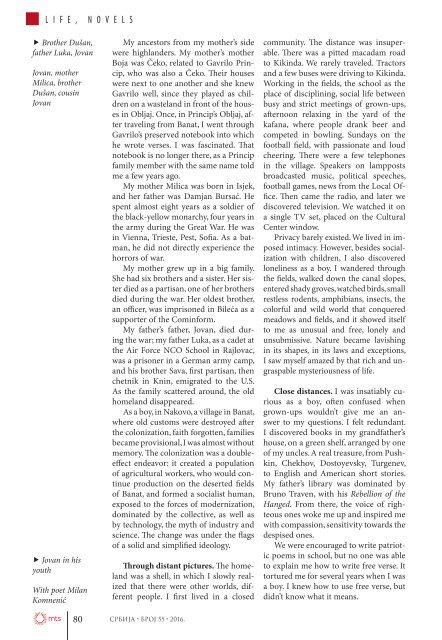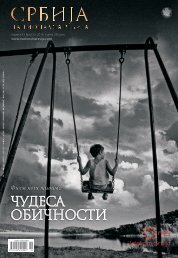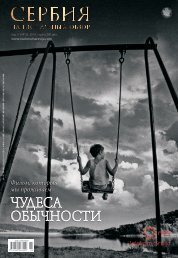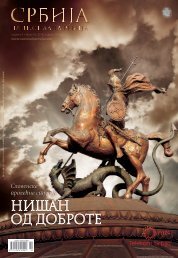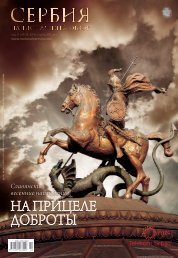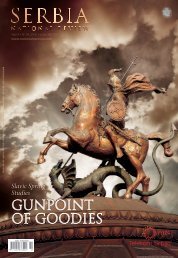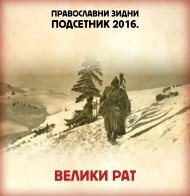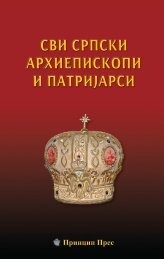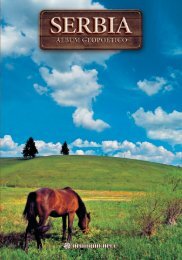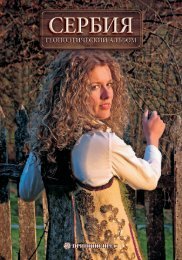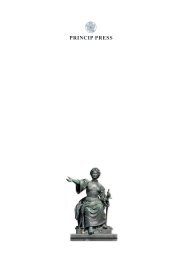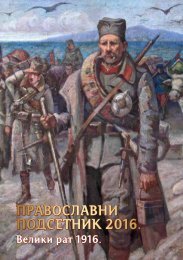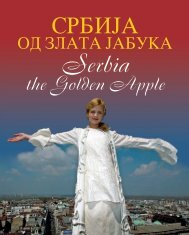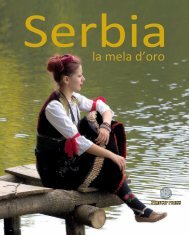Srbija - nacionalna revija - broj 55 - engleski - niska rezolucija
Create successful ePaper yourself
Turn your PDF publications into a flip-book with our unique Google optimized e-Paper software.
L I F E , N O V E L S<br />
Brother Dušan,<br />
father Luka, Jovan<br />
Jovan, mother<br />
Milica, brother<br />
Dušan, cousin<br />
Jovan<br />
Jovan in his<br />
youth<br />
With poet Milan<br />
Komnenić<br />
My ancestors from my mother’s side<br />
were highlanders. My mother’s mother<br />
Boja was Čeko, related to Gavrilo Princip,<br />
who was also a Čeko. Their houses<br />
were next to one another and she knew<br />
Gavrilo well, since they played as children<br />
on a wasteland in front of the houses<br />
in Obljaj. Once, in Princip’s Obljaj, after<br />
traveling from Banat, I went through<br />
Gavrilo’s preserved notebook into which<br />
he wrote verses. I was fascinated. That<br />
notebook is no longer there, as a Princip<br />
family member with the same name told<br />
me a few years ago.<br />
My mother Milica was born in Isjek,<br />
and her father was Damjan Bursać. He<br />
spent almost eight years as a soldier of<br />
the black-yellow monarchy, four years in<br />
the army during the Great War. He was<br />
in Vienna, Trieste, Pest, Sofia. As a batman,<br />
he did not directly experience the<br />
horrors of war.<br />
My mother grew up in a big family.<br />
She had six brothers and a sister. Her sister<br />
died as a partisan, one of her brothers<br />
died during the war. Her oldest brother,<br />
an officer, was imprisoned in Bileća as a<br />
supporter of the Cominform.<br />
My father’s father, Jovan, died during<br />
the war; my father Luka, as a cadet at<br />
the Air Force NCO School in Rajlovac,<br />
was a prisoner in a German army camp,<br />
and his brother Sava, first partisan, then<br />
chetnik in Knin, emigrated to the U.S.<br />
As the family scattered around, the old<br />
homeland disappeared.<br />
As a boy, in Nakovo, a village in Banat,<br />
where old customs were destroyed after<br />
the colonization, faith forgotten, families<br />
became provisional, I was almost without<br />
memory. The colonization was a doubleeffect<br />
endeavor: it created a population<br />
of agricultural workers, who would continue<br />
production on the deserted fields<br />
of Banat, and formed a socialist human,<br />
exposed to the forces of modernization,<br />
dominated by the collective, as well as<br />
by technology, the myth of industry and<br />
science. The change was under the flags<br />
of a solid and simplified ideology.<br />
Through distant pictures. The homeland<br />
was a shell, in which I slowly realized<br />
that there were other worlds, different<br />
people. I first lived in a closed<br />
community. The distance was insuperable.<br />
There was a pitted macadam road<br />
to Kikinda. We rarely traveled. Tractors<br />
and a few buses were driving to Kikinda.<br />
Working in the fields, the school as the<br />
place of disciplining, social life between<br />
busy and strict meetings of grown-ups,<br />
afternoon relaxing in the yard of the<br />
kafana, where people drank beer and<br />
competed in bowling. Sundays on the<br />
football field, with passionate and loud<br />
cheering. There were a few telephones<br />
in the village. Speakers on lampposts<br />
broadcasted music, political speeches,<br />
football games, news from the Local Office.<br />
Then came the radio, and later we<br />
discovered television. We watched it on<br />
a single TV set, placed on the Cultural<br />
Center window.<br />
Privacy barely existed. We lived in imposed<br />
intimacy. However, besides socialization<br />
with children, I also discovered<br />
loneliness as a boy. I wandered through<br />
the fields, walked down the canal slopes,<br />
entered shady groves, watched birds, small<br />
restless rodents, amphibians, insects, the<br />
colorful and wild world that conquered<br />
meadows and fields, and it showed itself<br />
to me as unusual and free, lonely and<br />
unsubmissive. Nature became lavishing<br />
in its shapes, in its laws and exceptions,<br />
I saw myself amazed by that rich and ungraspable<br />
mysteriousness of life.<br />
Close distances. I was insatiably curious<br />
as a boy, often confused when<br />
grown-ups wouldn’t give me an answer<br />
to my questions. I felt redundant.<br />
I discovered books in my grandfather’s<br />
house, on a green shelf, arranged by one<br />
of my uncles. A real treasure, from Pushkin,<br />
Chekhov, Dostoyevsky, Turgenev,<br />
to English and American short stories.<br />
My father’s library was dominated by<br />
Bruno Traven, with his Rebellion of the<br />
Hanged. From there, the voice of righteous<br />
ones woke me up and inspired me<br />
with compassion, sensitivity towards the<br />
despised ones.<br />
We were encouraged to write patriotic<br />
poems in school, but no one was able<br />
to explain me how to write free verse. It<br />
tortured me for several years when I was<br />
a boy. I knew how to use free verse, but<br />
didn’t know what it means.<br />
80 SRBIJA • BROJ <strong>55</strong> • 2016.


